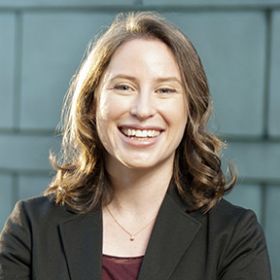People
Talia Gillis
Talia Gillis
“I think the Business Economics program is best suited for students with an entrepreneurial attitude towards their studies and research.”
Studying law and economics at the Hebrew University exposed me both to the normative way of evaluating the law as well as the theoretical and empirical tools used to assess the impact of those rules. Apart from my studies, a number of work experiences highlighted the ways in which human decision-making played a key role in how law is created and understanding law in action. My time as a clerk at the International Criminal Tribunal of Rwanda and at the Israel Supreme Court exposed me to judicial decision-making processes. Volunteering at the labor court in Jerusalem, where I provided legal aid to employees without legal representation, highlighted how difficulties in calculating social benefits, severance packages or assessing settlement offers created significant barriers for employees, rendering many legal protections futile.
My interest in how legal protections affect people in complex situations led me to become a doctoral student at Harvard Law School. Focusing on consumer financial regulation it became clear that to address the questions I was interested in I needed the theoretical foundation and training provided by an economics PhD program, realizing the importance of developing research experience in economics alongside my work in Law. I applied to HBS because I knew the program would provide a high-level of training in economics research in an environment that that encourages applying knowledge to important questions that have a significant impact in the real world.
I now find myself in an unusual and exciting situation in which I am concurrently a Business Economics doctoral student at HBS and a student in the Doctoral of Juridical Science program at Harvard Law School.
Research Interests
I study consumer financial decision-making and the regulation of consumer finance. I am interested in how the market and regulatory structure impact the way people interact with financial institutions and engage in financial transactions.
The study of the process by which regulators adopt policies, and the implicit theories of consumer behaviors that underlie these policies, made me aware of the gap that often exists between the theory and actual impact of law. Studying economics has provided me with the empirical tools need to closely evaluate the actual effects of policies. I also have a strong interest in experimental economics and the way in which government can use these research tools to develop and examine consumer financial regulation.
I feel that it is an exciting time to be studying consumer financial regulation. Although forms of regulation have existed for a while, only in the past few years have countries created unified regulatory agencies to oversee all issues related to consumer financial protection. Because this is an emerging field, there are exciting opportunities to influence regulation.
Business Economics Program
Business Economics students are considered students both of the Economics Department in the Harvard Graduate School of Arts and Sciences and of HBS. The primary responsibility for the program’s coursework is with the Economics Department and supervision of Business Economics doctorates is partially by professors in the Economics Department. The uniqueness of the Business Economics program is that students are also part of the HBS community so they have full access to the professors and resources provided by HBS. Of particular value is the way in which HBS faculty members have ongoing partnerships with companies and government agencies. Learning from HBS professors how to create and cultivate these relationships is foundational to my interest in field experiments.
The Business Economics program provides an ideal combination of the rigor of the economics PhD with the HBS philosophy that encourages broad exploration of research and methodological interests and interaction with students and faculty from other disciplines.
The HBS Experience
The administrative support is outstanding. The dedicated staff has provided me with guidance and support and truly encourages students to do the best they can. The research agenda of HBS faculty, which manifests a commitment to high quality rigorous research that can improve people’s daily lives, is pivotal in helping me shape my own research agenda.
Being a student both in the Economics Department and at HBS means you have multiple intellectual identities and academic audiences. These often emphasize and expect different things. This can be challenging at times, but it also encourages me to truly explore what kind of researcher I wish to become.
After HBS
After graduating I hope to embark on an academic career, allowing me to combine my interest in research and enthusiasm for teaching. I also hope that that my research will engage policy makers and have a direct impact on shaping law and regulation.
Advice for prospective HBS doctoral students
I think the Business Economics program is best suited for students with an entrepreneurial attitude towards their studies and research; students who are good at seeking out people to work with and exploring their interests.

